Community Part III: Lessons from Community Living
Reflections from my stay at the Embassy SF, Feb/Mar 2023
Last September, V and I sat on the couch in Bangalore with a map of India pulled up on the TV, zooming into different areas of the country and looking up articles and videos to decide where to go. One YouTube video particularly caught our attention — about Auroville, a 2500 person experiential community which Shenaz described as a “playground for adults” and “Burning Man all year round.” Our jaws dropped as she described Auroville’s many features: sustainable permaculture, cashless society, agnostic spiritual pursuits, equal resources to all residents regardless of labor. We packed our bags and went.
My interest in intentional communities began in college, when I convinced myself that communes were the primary path towards overthrowing neoliberal capitalism. These communities created the space for anti-capitalist modes of relating, so the theory went, and if enough of them popped up around the world and joined forces, they’d eventually become a viable replacement for today’s dominant forms of economic organization. Groups like IC.org create databases of communities like this around the world — similar in structure to worker cooperatives, which this Upstream episode deems “islands in a sea of capitalism.”
Inspired by a lot of thinking and conversing about utopias, I dipped my toes in the “community living world” through visiting coops, interviewing their members, doing short stays, and of course, reading theory. I grew intrigued by the concepts of food sovereignty, consensus-based decision making, and a sharing economy, among other tenets I spotted in intentional communities. (Upon further reflection, I realized that the 6-person joint household I grew up in operated very much like a commune already, though without the fancy terms. This made me realize that while the terminology is often presented as “fresh,” the concepts underpinning coops are age old and, in fact, historically common among non-Western cultures).
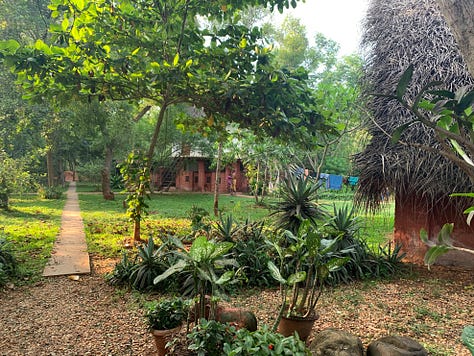
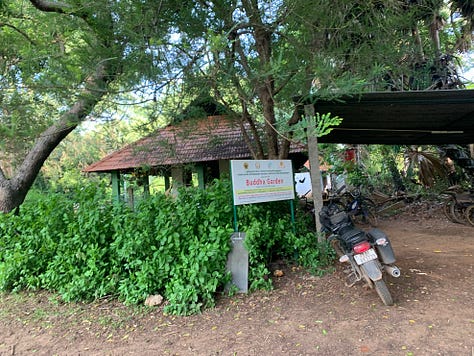

Auroville was by far the largest community I’ve visited, and the longest lasting one too. Founded in the 1960s by a French woman named Mirra Alfassa, the community has attracted thousands of people from around the world in search of communal and spiritual development. I met some very interesting people there, learned about their land disputes with the government and relationships with the nearby village, had a beautiful massage and sound healing experience, and tried my hand at farming. At the same time, I couldn’t help but feel like there was a more ominous side to the society — something palpably religious and perhaps cultish about a giant orb in the center of town you had to book time to meditate in, and constant references to their founder as “The Mother.”
Upon returning to San Francisco, I took a more serious interest in the community living scene locally. As it turns out, there is an extensive ecosystem of coops right up the street from my apartment. Haight Street Commons is a network of 50+ affiliated international communities throughout the city and East Bay. The associated nonprofit District Commons runs a 2k+ person slack channel for the community called “An Accidental Megastructure” which houses channels ranging from discussions on new sovereignties and radical academia to watercooler conversation and events listings. (I later discovered that each house also has their own subset of public or private channels to coordinate various things).
After lurking in the Slack and browsing the “rooms offered and wanted” channel for several months, I decided to experiment with a short-term stay at The Embassy SF, a popular hub in the SF coop scene with a reputation for philosophical/academic/activist vibes. According to their 40-page handbook, The Embassy’s core values are experimentation, openness, consensual engagement, learning & unlearning. They emphasize not the tragedy but the comedy of the commons, in which you “leave things in a better state than you found them.” I also read a bit about their do-ocracy and decision-making (but found the latter to be less relevant for a shorter stay).
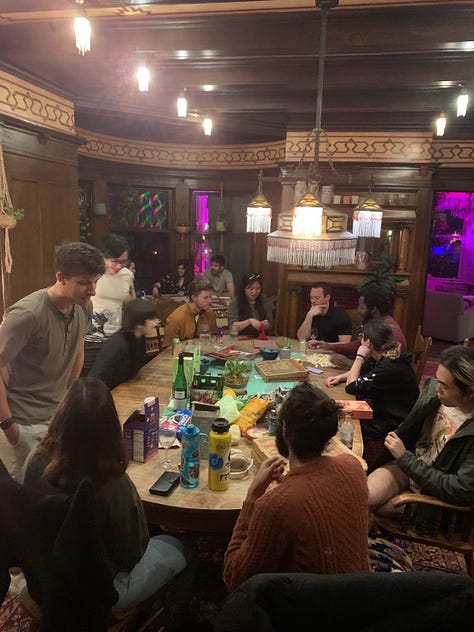
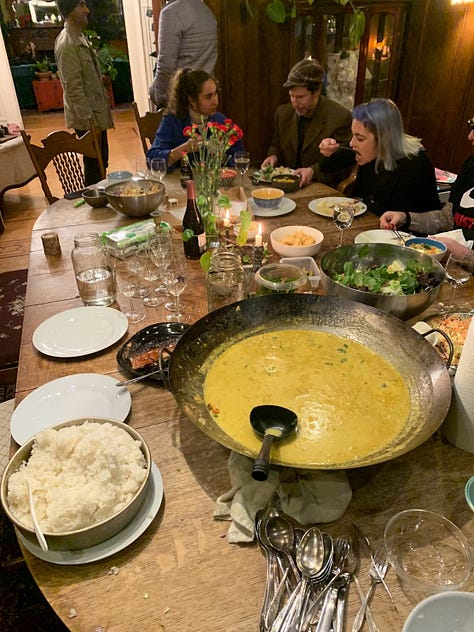
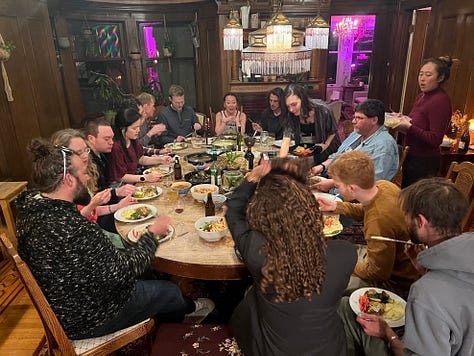
Expectedly, there was a heavy emphasis on sharing from the get-go. Everyone pays the same community dues for shared food, utilities, cleaning, and cars. The bedrooms have an open door policy (as in, anyone can use any room as long as the door is open), and are referred to by their own names as opposed to the humans who usually stay there (e.g. “I’m gonna be in Lovelace” not “I’m gonna be in Franziska’s room”). I especially love the culture of cooking more food than one will personally eat, then leaving it for housemates on the stove or ringing the gong to signal a house dinner.
Coordination and communication were not as difficult as I expected it to be among a rotating cast of 15+ people. There is a Signal group called “ESF Current” where present residents share relevant updates and questions (e.g. “There’s food on the stove” or “I’m having 10 friends over”), and various Slack channels ranging from food requests to things that need to be done around the house. There is also a weekly house meeting (which the permanent residents usually invite us guests to attend) and a shared GCal to coordinate car usage.
The space itself is a beautiful 100+ year old Victorian mansion, with intentionally curated common areas. There’s a comfy living room, elaborate dining setup, two kitchens, another living room called the “salon” where there are often events, an anti-social “study” room, fitness area, and movie/hookup room for those staying in the 6-person shared space. There are several outdoor spaces including front porch, garden, and “biosphere.” Since several people work from home, there are various desks set up including my personal favorite, the bathroom-turned-office where you can sit and work with your legs hanging in a bathtub.
While the bougie exterior feels a bit contrary to the goals of a commune, the Embassy does a good job of hosting public events and having open conversations about how it can be more accessible. Many Haight Street Commons meetings are hosted here, as well as monthly Group Muses with live classical musicians, Second Life, and community-wide potluck dinners (among various other ad-hoc activities). I even got to meet dozens of people from a Chinese co-living community called 706 that had a weekend-long conference in our living room.
I could go on and on about the various conversations, events, and happenings I participated in and observed during my two months at the Embassy (and if you have a conversation with me about it, I will lol). But as my time there has recently come to an end, there are a few lessons that stand out to me as ones I will remember for a long time.
Firstly, I experienced community care firsthand when I tested positive for COVID during my stay. Rather than isolating me or throwing their hands up since they didn’t know me that well at this point, the house mobilized immediately to get me what I needed. One housemate made me soup, another brought me meds; they put me in the nicest room in the house to quarantine and let me use other spaces limitedly with a mask; and everyone was generally incredibly kind and drama-free about it.
Secondly, I was trusted to sit in on a negotiation between three members of the broader community and learned that it’s common to have a mediator sit in on personal conflicts. What I saw was an empathetic and mature approach to conflict resolution, and a “community first” approach to relationships. It’s never easy to sit through the emotions that arise from conflict, and feeling a community around you during this could be supportive and also more complicated. (Read more on relationship transitions in international communities here).
Finally and perhaps more importantly, I find comfort in the fact that there is still a group of people in SF who do actually believe in the commons and are working towards relating to each other in beautiful, cooperative ways. It’s easy to think that we’re only surrounded by AI bros and hacker houses (who are, admittedly, a larger fraction of coops that many long-term residents care for) but there is a strong contingent of folks with shared anti-capitalist values and see coops as the embodiment of that.
Despite some expected drawbacks — finding it hard to carve out alone time, for instance — my stay at the Embassy was wonderful and fulfilling. A week later, I’m already missing the unstructured social time with housemates, random people and events showing up just outside my bedroom door, and the ability to make a giant pot of pasta and have it be eaten within the hour (it took me 5 days to finish the one I made earlier this week). While I’m sure permanent residents have to deal with much more real shit than I did in my short time, I’m looking forward to experiencing these ups and downs as well in a longer-term co-living situation in the future (perhaps this fall!)
As far as “overthrowing neoliberal capitalism” goes, the jury’s still out on that one. I don’t know whether coops will ever reach the scale of replacing dominant modes of economic thinking and relating, but I do feel hopeful with the firsthand experience that some are seriously trying. And, in the meantime, coops are offering more and more people the option of interrogating these ideas in a sort of mini-utopia setting. It’s been a joy to be a part of that.
As my current time in San Francisco sadly comes to a close (more on that soon), I’m grateful I got to experience the city’s take on international communities before embarking on the next chapter. While many parts of SF feel ephemeral — as the tech industry continues to displace people left and right, and the young professionals around me are moving in and out — I am confident that the Embassy will still be here, in some form, when I inevitably return. Maybe that’s some version of having roots :~)





This makes me miss San Francisco. Tech capitalism is strong in SF culture, but this reminds me there are other spaces with people thinking and living in other ways.
the last photo!!! <3